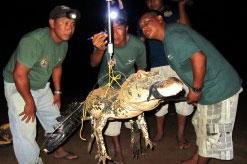You are here
- Home
- blog_categories
- Disputed Landscapes
- Civil Society Key to Global Environmental Challenges - Géraud de Ville
Civil Society Key to Global Environmental Challenges - Géraud de Ville
29 October 2014

Five research projects, funded by the European Union's Research and Innovation funding programme (FP7) present strong evidence that local communities and civil society organisations are playing a significant role in helping support the delivery of international agreements such as the Aichi Biodiversity Targets of the Convention on Biological Diversity, United Nations Sustainable Development Goals and Kyoto Protocol on Climate Change.
Using innovative methods such as participatory action research, visual communication and community decision support modelling these ground-breaking projects have identified, adapted and shared local community best practices across the whole of Latin America empowering communities to have a voice, strengthen local governance and maintain human well-being.
These communities are the most impacted and vulnerable to climate change, inappropriate development decisions and the resulting environmental and social issues, but these same communities are the very ones that are most effective at protecting the environment, using resources efficiently and delivering on low-carbon economy objectives.
The IPCC Climate Change 2014 report acknowledges this stating:
Indigenous, local, and traditional knowledge systems and practices, including indigenous people's holistic view of community and environment, are a major resource for adapting to climate change, but these have not been used consistently in existing adaptation efforts. Integrating such forms of knowledge with existing practices increases the effectiveness of adaptation.
However, policy consistency is required as whilst there are calls for support of communities and local action, other initiatives are undermining communities by supporting destructive development, removing land rights, restricting access to resources and furthering the loss of local natural capital
Lakeram Haynes, an Indigenous community researcher from Guyana, expressed the following wish for policy makers to consider, 'We should let local and international proved solutions blend to tackle emerging global challenges.'
Results from Project COBRA and its EU sister projects CiVi.net, COMET-LA, EcoAdapt and COMBIOSERVE have demonstrated that solutions delivered at a local level result in sustainable actions that protect the environment and the wider ecosystem services and benefits they provide. By respecting the diversity of languages, lifestyle, worldview and environmental context, policy actions can be adapted locally for effective delivery that not only benefits local communities but protects the environmental services we all rely on.
We are grateful to Project COBRA for permission to reuse this post. Project COBRA brings together South American and European civil society organisations that have extensive experience in enabling grassroots solutions to complex problems. Géraud de Ville is a PhD student in the OU's Department of Engineering & Innovation, whose research focuses on the use of information and communication technologies by indigenous communities in the Guiana Shield region of South America.
Share this page:
Contact us
To find out more about our work, or to discuss a potential project, please contact:
International Development Research Office
Faculty of Arts and Social Sciences
The Open University
Walton Hall
Milton Keynes
MK7 6AA
United Kingdom
T: +44 (0)1908 858502
E: international-development-research@open.ac.uk
.jpg)